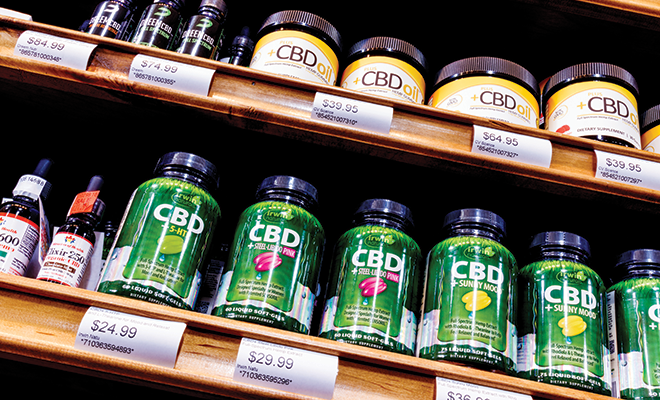
Breast Cancer Recovery and CBD Foods
Breast cancer, the thought alone is enough to induce lack of appetite and nausea. However, with the advances of modern medicine and treatments, survival rates are almost at 100 percent with just localized tumor growth, according to the America Cancer Society.
H owever, even with these amazing treatments, the recovery from breast cancer can be an unruly experience. CBD foods are quickly becoming a popular aid for the many side effects of cancer treatment.
Cannabis oil is a thick, sticky substance composed of cannabinoids, tetrahydrocannabinol and cannabidiol, or CBD, which is acquired from cannabis flowers. It is the most concentrated form of cannabis products. Some of the many common conditions for which cannabis oil has been used include Crohn’s disease, diabetes, glaucoma, asthma, epilepsy, anorexia, opioid dependence, strokes, Alzheimer’s disease, Parkinson’s disease, HIV, dementia and, above all, cancer.
CBD’s Role in Cancer Recovery
CBD has primarily been used to help treat seizures and reduce anxiety and paranoia. The National Cancer Institute states that CBD is useful in treating the side effects of cancer and may ease the pain of some common cancer treatments like chemotherapy. They also state that the effects of medical cannabis could include anti-inflammatory activity, the blocking of cancer cell growth, the prevention of the growth of blood vessels that supply tumors and the improvement in antiviral activity. Recent studies indicate that only cancer or tumor cells are affected by cannabinoids and normal cells are not affected. However, it is too early to make any claims about CBD for cancer treatment.
Researchers note that CBD is very likely a safe add-on therapy for treating pain and nausea and for appetite stimulation. It may also increase the efficacy of standard chemotherapy treatments, which means that chemo could be more effective, possibly requiring lower and less toxic doses, when used in combination with cannabis. Of course, it is always recommended to consult your doctor before adding any new treatments to your current regimen.
Both cancer and its treatment can lead to pain. Cancer often causes inflammation, pressure on internal organs, or nerve injury that may result in pain. When the pain is severe, it can even become resistant to powerful pain relievers. CBD indirectly acts on widespread pain by reducing inflammation.
Common CBD Sources
CBD is widely distributed in many forms. Some people prefer using a CBD vaporizer or inhaler because it delivers the CBD into the system very effectively. Other ways to take CBD oil include oral administration via capsules, mouth strips, and edibles such as gummies or chocolates. Another option is to apply it topically using a lotion, cream, balm or patch. It all depends on how the person tolerates CBD and the way in which the CBD treatment is most effective for them.
Nutritional Hacks during Cancer Recovery
Cancer treatments can cause more than just the side effects of pain, nausea and loss of appetite. There are also constipation, diarrhea and sore mouth or throat. There are many nutritional remedies that can help conquer these side effects during treatment and recovery.
When you experience constipation, you can gradually increase your intake of high-fiber foods by including them in meals and snacks. Good sources include whole-grain and bran cereals, oatmeal, brown rice, fresh fruits, vegetables, beans, peas and lentils, as well as nuts and seeds. Drink plenty of fluids. Aim for eight cups of total fluids per day. Always check with your registered dietitian, doctor or nurse before taking a fiber supplement.
If you have severe vomiting, it may need to be addressed with medication. However, if you have queasiness with little or no vomiting, eating the right foods at the right times can help. You can try to eat five to six small meals a day and avoid greasy, high-fat foods. Ginger soda, ginger tea and ginger candies can help combat nausea. Consider eating cool, light foods and drinking liquids between, rather than with, meals.
If you are experiencing severe diarrhea, medication may be necessary, but food also can play a key role. Nutritionally, you can eat small frequent meals, nibble on salty foods to replace electrolytes and keep non-caffeinated fluids handy. You could temporarily try the BRAT diet, which involves consuming Bananas, Rice, Applesauce and Tea until symptoms resolve. This gives the gut a chance to rest and reduces the amount of stool produced.
Some chemotherapy medications can cause a sore or dry mouth and throat. To lessen mouth irritation, try soft or liquid foods such as smoothies, warm soup, thin oatmeal, yogurt, eggs, pudding, mashed potatoes and canned fruit. Soften food with milk, broth, sauces or gravy. Try frozen grapes, cantaloupe wedges, peach slices or watermelon. In addition, you can consult a registered dietitian nutritionist for more information on nutrition’s role in preventing cancer development and during cancer treatments and recovery. ■
Sources: eatright.org, cancer.org, medicalnewstoday.com and medicalcannabisoutreach.com.







